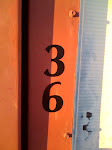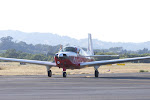
I was 19 and I was working on my private pilot's license. I only had about 30 hours of flight time. I was flying solo and doing some touch-and-go landings at Maple Lake, MN (KMGG). I was using runway 10, which has a lake at the end of it. Take off was normal and I was climbing to pattern altitude and was just about to make my turn to crosswind when the engine on my Piper Tomahawk stopped. A million things go through your mind at this point. But you're trained to fly the plane. Panic comes later, hopefully. I quickly pushed the nose over as I was trained and got the plane into a gliding attitude. I was only 300 feet above the ground, which did not give me enough altitude to turn around and land on the runway. I quickly assessed my situation and realized that I was going to have to ditch the plane in the lake. I would not be able to make it to land. At the far side of the lake I saw some kids playing on a floating raft. I thought if I landed near them they would certainly see me and hopefully be able to call for help or at least find my body. This all happened within seconds. Aviate, navigate, communicate. Every good instructor drills that into you and makes you practice by flying along and cutting the engine on you, forcing you to constantly think about where you would land in an emergency. Aviate, done. Navigate, done. Communicate? I got on the radio and called in a "mayday" knowing that I was on a rural unicom frequency and probably would not be heard. But I did it anyway and I'm glad I did. A few moments before, my instructor happened to walk into the FBO and heard my call on the radio. Thankfully, he knew I wasn't kidding. I'll never forget his first words, "Scott, do your check." Somehow he knew I would probably be freaking out and not have the sense to do my emergency check of the systems. Almost immediately I noticed that I had forgotten to turn on my backup electrical fuel pump. This is a redundant pump meant just for emergencies like this. It's incredibly rare that the engine's mechanical pump would fail. But fuel is important so that's why they make a backup and that's why the checklist says to turn it on when taking off and when landing. A few seconds after I turned the fuel pump on the engine came back to life. With the prop spinning in the wind, it was like popping a clutch on a car. I was only about 100 feet above the lake and the kids on that raft I was aiming for looked more panicked than me. They started watching me right after my engine went silent. I wasn't more than a couple hundred yards away from them when the engine came back to life with a roar. Immediately I stopped my glide, gained some speed and slowly turned toward the airport. I made the beginners mistake of getting back into the pattern. I should have slowly made my turn and landed on the opposite runway. But I was fortunate. I landed, taxied back to the FBO where I was met by my instructor. I got out of the plane and tried to keep standing on my severely weakened knees. "You know, it's rare a mechanical pump fails?" he said. "Oh really?" I replied. I left and stayed away for about two weeks replaying the scenario over and over. Then Jim called me and said, "It's time to get back on the horse." I never forgot to turn on the backup fuel pump again.



hi thanks...
ReplyDelete